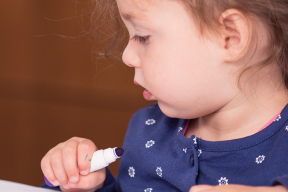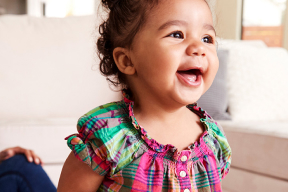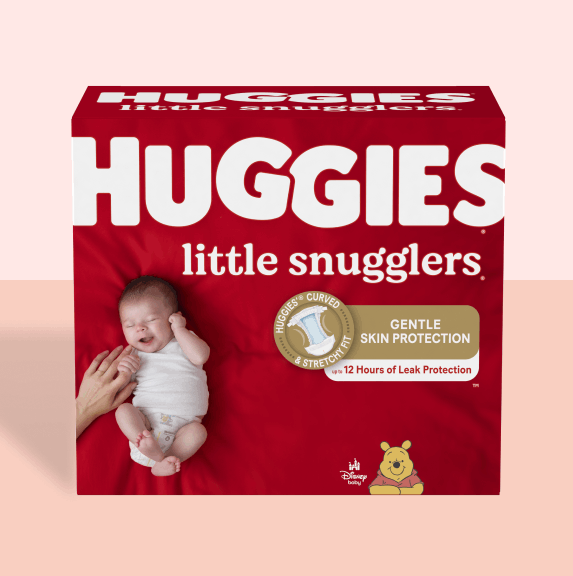Growth and development at 27 months old
There’ll be lots of hand washing and drying this month, especially if your toddler has been toilet trained and has been practicing. Make sure they can access the sink but keep an eye on them. Water play is wonderfully enticing and can be too much of a temptation to resist.
Point out to your toddler which towel is theirs, but don’t expect them to care much. Near enough is good enough for toddlers: if they see, they want. What is yours is theirs and what’s theirs is theirs, too! They see no point in sharing or making sacrifices for the sake of others and their feelings. That’s why staring at someone who has a different appearance is common. Pointing and asking why someone is different may make parents feel awkward and uncomfortable, but your 27-month-old has an insatiable curiosity and will pester you until they are satisfied with your answer.
Play and interaction at 27 months old
Your toddler may develop a close attachment to a special toy or blanket and insist on having it with them when they go to sleep. This is entirely normal and age-appropriate. No matter how devoted your child is to their transitional object, it can in no way replace you on the totem pole of their affection. Some children are more tactile than others and will rub or stroke a toy across their top lip, especially when they are tired or sad. Some parents worry that thumb sucking, finger sucking, or becoming attached to a special toy is a sign of their toddler being overly emotional and weak. Young children develop emotional attachments for all sorts of reasons and there is generally no cause for concern.
What you can expect at 27 months old
Not wanting to be restrained in any way, shape, or form can cause conflicts between toddlers and their parents. Unfortunately for them, being strapped into the car seat, shopping cart, and strollers is a fact of life. By this age, many toddlers have learned what’s involved in unbuckling themselves. This means that parents need to build a repertoire of responses to deal with this. Simple reward systems work well. You may also choose to not start the car until buckles and straps are secured. If your toddler learns that throwing a tantrum and protesting gets them what they want, this behavior is quickly reinforced.
Some aggression can show itself this month since toddlers have yet to learn about social niceties and have not yet mastered self-control. Kicking, punching, biting, and shoving are all common physical responses to frustrating situations. This means there could be some awkward situations between other parents as you try to advocate for your own child and show the right degree of empathy for theirs. Remember that toddler behavior often stems from the immature, primitive parts of the brain. They have yet to develop higher reasoning centers that generate socially acceptable behavior.
Food and nutrition at 27 months old
If your toddler is still drinking from a bottle, now is the time to stop. Bottles filled with milk or juice can lead to tooth decay. There is a range of toddler cups with different types of spouts available, although most toddlers are capable of drinking proficiently from an ordinary cup. Set a good example by drinking plain water rather than soft drinks or large amounts of caffeine or alcohol.
Keeping your toddler healthy at 27 months old
When your little one is sick, your patience and compassion is vital. Research has shown that children whose parents demonstrate genuine caring behaviors and empathy are in the best possible position to develop good mental health. Feeling things with your toddler and doing what you can to make them comfortable is important, both physically and mentally. Even though it sounds premature, they are learning what is involved in parenting at this early age. Nothing is wasted on your toddler, especially love and kindness.
General tips
- If you don’t have a pet, consider if now may be the time to get one. Your little one will learn about respecting animals and what is involved in caring for them by watching you. Gentle handling, feeding, exercise, and play are all important concepts to learn.
- Have a date night out with your partner and focus on your relationship. One of the most positive things you can do for your toddler is to have a solid, loving relationship with your partner. Couples who are united and share in their children’s care tend to recover more quickly from adversity and gain more pleasure from family activities.
- Do some form of exercise every day and involve your toddler. A simple walk around the block, an outing to a museum, or even a bike ride are all great ways to exercise and connect as a family.
- If you have a phobia about spiders and other creepy crawlers, try to hide this from your toddler. Research has shown that children don’t have a natural fear of wildlife but tend to develop it because of observing their parents’ responses.
The information of this article has been reviewed by nursing experts of the Association of Women’s Health, Obstetric, & Neonatal Nurses (AWHONN). The content should not substitute medical advice from your personal healthcare provider. Please consult your healthcare provider for recommendations/diagnosis or treatment. For more advice from AWHONN nurses, visit Healthy Mom&Baby at health4mom.org.









